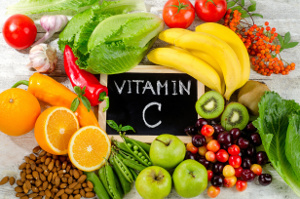There’s a link between hypertension, vitamin C deficiency, and elevated homocysteine
 Hypertension is a ticking bomb and can increase the risk of blood clots, stroke, and other diseases. Many people have too high blood pressure without knowing it. A contributing factor is elevated levels of the amino acid homocysteine as a result of incomplete protein metabolism. According to a study published in Frontiers in Nutrition, however, vitamin C is able to lower levels of homocysteine, thereby reducing the risk of hypertension.
Hypertension is a ticking bomb and can increase the risk of blood clots, stroke, and other diseases. Many people have too high blood pressure without knowing it. A contributing factor is elevated levels of the amino acid homocysteine as a result of incomplete protein metabolism. According to a study published in Frontiers in Nutrition, however, vitamin C is able to lower levels of homocysteine, thereby reducing the risk of hypertension.
Hypertension is known to cause ischemic heart disease, blood clots, stroke, and other cardiovascular diseases. Some people may get heart palpitations, headaches, mild vertigo, and nosebleeds. According to WHO, 1.4 billion people worldwide suffer from elevated blood pressure, and the annual death toll is around 20 million.
Overweight and alcohol abuse increases the risk of hypertension. The problem also occurs in connection with type 2 diabetes and its precursor called metabolic syndrome because of a disrupted sugar metabolism. It is important to manage hypertension, but antihypertensive medicine is known to cause side effects such as fatigue, headaches, nausea, sleep disturbances, dry cough, itching, and impotence.
Lifestyle plays a major role in the development of hypertension, and science has also found a link between elevated homocysteine levels and high blood pressure. Homocysteine is an amino acid that is produced as a byproduct of the breakdown of another amino acid called methionine that is found in dietary protein. Homocysteine, however, is just an intermediate compound that gets broken down and converted into a third amino acid called cysteine that has many essential functions. Levels of homocysteine must not exceed a certain point. Otherwise, the compound becomes toxic and can cause oxidative stress and dysfunctions in the blood vessel endothelium. This can result in blood constriction, stiff blood vessels, and other trickle-down effects that lead to hypertension.
Previous studies have shown an inverse relation between homocysteine and vitamin C. Still, it remains unclear if there is a link between vitamin C, blood levels of homocysteine, and hypertension.
In the new study, the researchers used data from the large NHANES (National Health and Nutrition Examination Survey) population study. A total of 7,327 participants were included. The researchers collected data from the database about blood pressure, blood levels of homocysteine, and vitamin C levels. Afterwards, they used various analytical methods to study the link between the three variables (vitamin C, homocysteine, and hypertension). They looked at both systolic and diastolic blood pressure.
According to their findings, blood levels of homocysteine were statistically linked to systolic blood pressure and were linked negatively to vitamin C. Still, there was no statistical relation between diastolic blood pressure, vitamin C, and homocysteine.
The researchers concluded that patients with hypertension should pay attention to blood levels of homocysteine and vitamin C. It may also be relevant as part of antihypertensive therapy to use vitamin C supplements, to regulate elevated homocysteine, and to introduce other antihypertensive strategies.
Vitamin C’s effect on blood pressure
Vitamin C contributes to collagen synthesis, which is important for our connective tissue, including the tissues such as blood vessels. Vitamin C is also a powerful antioxidant that protects cells and tissues against oxidative damage. In their new study, the authors mention that vitamin C is important for the body’s production of different prostaglandins and nitric oxide (NO), which helps regulate blood vessel pliability and blood pressure.
Vitamin C sources, deficiency, and supplementation
Good sources of vitamin C include citrus fruits, rosehips, berries, red bell pepper, cabbage, spinach, garlic, herbs, and a variety of other things. Despite its presence in many foods, there is widespread vitamin C deficiency, which is because many people fail to adhere to the dietary guidelines with regard to fruit and vegetable intake. For those who choose to take a supplement, it is advisable to take a non-acidic form of vitamin C that is gentle on the stomach.
- 92 percent of Danish men and 87 percent Danish women don’t eat enough fruit and vegetables
Source: Fødevareguiden
Read more:
»Many dietary antioxidants lower your risk of elevated blood pressure«
References:
Peng Wu et al. Association between homocysteine and blood pressure in the NHANES 2003-2006: the mediating role of Vitamin C. Frontiers in Nutrition 2024
TIP! See also the related articles
Search for more information...
- Created on .








